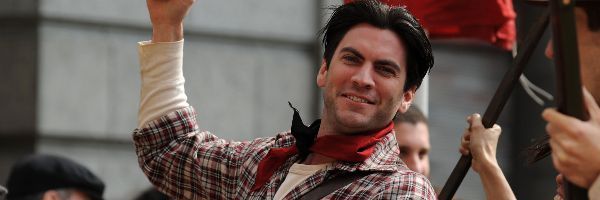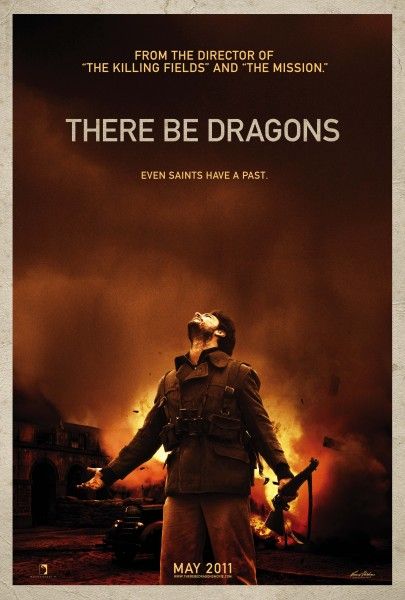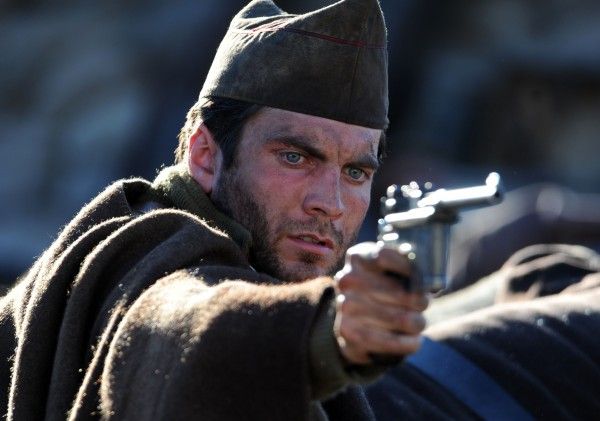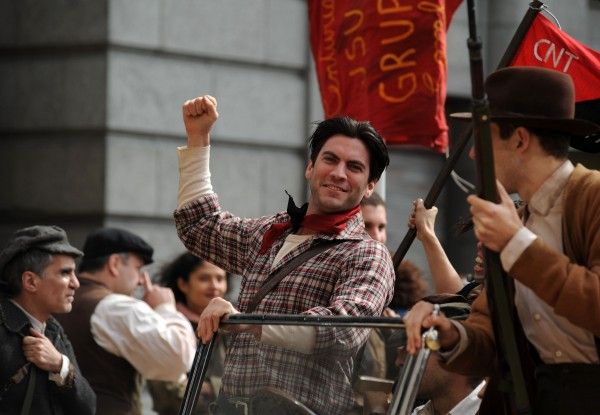The drama There Be Dragons is an epic tale of revolutionaries and saints in a time of Civil War. It is a heartbreaking story about the power of forgiveness and overcoming your past, which is something that actor Wes Bentley knows all too well. After being catapulted to fame with his stand-out performance in American Beauty, he turned down several major roles and all but disappeared from the public eye. Now, all these years later, he’s openly talking about only taking roles to be able to pay bills or buy drugs, his current sobriety, and his desire to become the actor he always wanted to be.
At the film’s press day, Wes Bentley talked about how cathartic this particular role was for him personally, the challenge of playing a man from his younger years through the age of 78, reconnecting spiritually in his own life while shooting the film, and how he enjoys acting for the opportunity it gives him to dig into the choices one makes in life. He also talked about his next role as a detective in the abduction thriller Gone, starring Amanda Seyfried. Check out what he had to say after the jump:
Here’s the synopsis:
There Be Dragons tells the story of London-based investigative journalist Robert Torres (Dougray Scott), who visits Spain to research a book about Josemaria Escriva (Charlie Cox), the controversial founder of Opus Dei. But, Robert hits a professional and personal wall when his most promising source, who also happens to be his own father, Manolo Torres (Wes Bentley), turns out to be the least cooperative one. Robert begins to unearth his father’s toxic secrets when he learns that Manolo was not only born in the same Spanish town as Josemaria, but that they were childhood friends and attended the same seminary. However, the two men took radically different paths in life, with Josemaria dedicating his life to his faith while Manolo was swept into the brutal Spanish Civil War. Their overlapping journeys are revealed with the truths and sorrows of their past choices, which compels Manolo to confront his own secret with one last opportunity of forgiveness.
Question: Given your background and what you’ve personally gone through, did you find a film like this to be cathartic for you?
WES BENTLEY: Oh yeah, definitely. It was cathartic, in a lot of ways. I was in a dark place, which you may have read, at the time. I was coming out of addiction, and when I came to do the film, I was just thankful for doing a film, especially of this quality with (director) Roland Joffé and with all of these great people who worked on it. When I got to really work on the character and so the similarities, I realized that Manolo was a very isolated person and I felt like I had self-imposed isolation. I had a great family, but I pushed them away. Fame led me to push away people, in general. I used to love people. So, I shared that with Manolo, and I shared making bad choices in my life, as we all do. It was not to that degree, but similar. And, while doing the film, I was facing these things a lot, particularly as older Manolo, which I shot first.
Asking for forgiveness on your deathbed when you’re 78 didn’t seem appealing, so I realized that I wanted to do it now. That was encoupled with this great woman I had met, who now is my wife. I had already stopped doing drugs, but I hadn’t stopped drinking and I hadn’t made the choice to quit forever. There were also a couple of people on the film who were sober and didn’t know that I had a problem, but their life was so attractive that I was like, “You know what? I want to do this.” So, I made a choice there and, in doing that, I reconnected to a lot. There were so many things that I didn’t expect. Spiritually, I just reconnected to the world and my soul was beginning a long process of healing. So, it was cathartic, in that sense, and it was cathartic, as an actor. Every scene with Manolo was very dramatic, very tough, very dark and very challenging. That’s what actors love to do. It was great to get back out there and do something that challenging again. It had been awhile since I had had a challenge like that, and challenged myself, and been sober for it.
How was it to prepare for this role?
BENTLEY: It was very challenging. The hardest thing I’ve ever done, as an actor, was the old Manolo stuff, and I did that first, which was extra challenging, but I love that. The kind of actor I am now back to being is one who loves that kind of challenge. I had to work hard on the body movement. The make-up does only so much, and your body has to do the rest, so I had to work with a body coach who was in their late ‘70s. And, I worked with a great accent coach. We didn’t want to make the accent sound like he was struggling with the language, but rather that he was Spanish, speaking English. That was very tricky. It was a lot of work and we had a short amount of time to do it, but we had such a great team that it paid off.
Had you been aware of Opus Dei prior to doing this film?
BENTLEY: Both of my parents were preachers and I grew up in the church, but they were Methodist ministers, so I didn’t know much about Catholicism and I definitely didn’t know anything about Opus Dei or Josemaria (Charlie Cox). I had to do the research beforehand and get involved that way, so I didn’t know the controversy. I still don’t know it, really. Looking at the film, from my prospective, I don’t see that it’s necessarily pro-Opus Dei. Since those issues aren’t touched on, I can see how they’re seen as right wing. We also had Roland Joffé, who his agnostic. It was a great choice because I don’t think it’s a religious film. I think it’s a spiritual film and I don’t think it’s trying to push any kind of religious nature, but because of Roland, that’s clear. He explored the spiritual nature and the relationships, but I don’t think he got too much into the politics.
What was it like to work with Dougray Scott? Did the two of you prepare together at all?
BENTLEY: Yeah, we did. We only had about a week and a half for rehearsals, which is not a lot of time. But, Roland was great. He was very prepared. We did a lot of improve exercises. Dougray and I spoke on the phone in the same hotel, but in different rooms, and it created distance between us, as the characters. We didn’t sit in a room together and work it out, but we did it by distance. It was difficult because Dougray sees me in the old man make-up and can work with that, so I didn’t have to do a whole lot because of all the work that he did in his eyes. He’s a great actor and that made it easy to see the pain he was going through.
What did you do, as an actor, to get in the mind-set of being a 78-year-old man?
BENTLEY: It was just about piling on a lot of information. I studied Spain, in general, throughout the 20th Century, up until the ‘80s. I had to build a life for him between the ‘30s, when we leave him, and then pick up with him, as the older man. I had to decide, “What was his relationship with the government? What was the government like? What did he do in the government? What are the choices that he made that weighed heavily on him?” And, as I was piling up all of that, it was starting to weigh on me more. That’s what weighed on my soul. The thing that never left was the big, terrible thing that he did wrong. That never went away, and I just pictured that festering in a person for decades and living with the person that it most affects. That literally crumbled me. Not only did a play him as a man in his 70s, I felt beaten up, soul wise. It was dark. I felt a lot of heaviness, and it affected me physically and emotionally. It was part of what made me realize, “Oh shit, I don’t want to be there.”
What was the make-up process you had to go through?
BENTLEY: It was four hours of make-up. It was nasty. I’d get there at 4 am and go to the make-up trailers, which aren’t the warmest. First, I would have to shave. Then, they would put glue on a freshly shaven face. And then, they would powder that and glue it again, and you had to make sure your eyelid wasn’t sticking. I would have to shave my chest too because it went all the way down there. And, it was in large pieces and I just had to sit patiently while they did it. It taught me to be patient and calm in my body. I was still a bit jittery, at that time.
How did you physically prepare for this role?
BENTLEY: The anarchists weren’t trained properly, so they wanted to show that. That’s the way the war was. It was just a lot of idealists coming over to fight, and they didn’t know how to fight. For my character, I wanted to get in shape for it. I had about a month off, between older Manolo and younger Manolo, so I worked out a lot and ran, just to get myself in shape. But, at the end of the day, it wasn’t as difficult as it seemed. It looks like we worked harder than we did.
How many cameras did Roland use for the action scenes?
BENTLEY: There were a lot of cameras. I couldn’t even spot them all, in the main battle – the Battle of Madrid. I think there were four or five, and then there was the mini-camera on a Segway. They didn’t tell us what was going on, in that battle. Roland just said, “You’re going to follow this guy,” and we were like, “Okay.” There were several cameras going and I kept running through and looking right into lenses, which is the big no-no. I didn’t know where anything was. We were just reacting to explosions and stuff. Regularly, there were two, but for the actions scenes there were five or six.
Did you learn anything about yourself, from the experience of making this movie?
BENTLEY: Yeah, I reconnected spiritually while I was on this film, but it wasn’t due to the religious nature of the film. I grew up in the church and had religion in my life for a long time. I’m not really a church goer, but I definitely had a hunger for a spiritual connection to the world and for my soul to be healed. It happened on this film, partly because of the character, partly because of the people I was around and partly because it just seemed like fate. I had all of these opportunities to get better, and part of it was the film.
How long did you shoot this film?
BENTLEY: We filmed for four months in Argentina, and then I think they shot another week or two weeks in Spain. Altogether, it was four months. It was a long shoot, but it was fun. We did a lot in the mountains, as well as Buenos Aires.
What do you think is the greatest gift that acting has given you, and what do you think you have brought to acting?
BENTLEY: That’s a good question. I think the greatest gift actually acting is that I have a true fascination and love for people, and the way they are, and all the choices they made in life and all the different paths they took. I feel like acting gives me an opportunity to dig a little bit into that. It doesn’t make you a specialist of any kind, but you get to invest in it for a little while and discover things about that lifestyle and the way that person lived that lifestyle. That’s great because it’s eye-opening and it makes you an open person. I don’t know about what I’ve given to acting. With American Beauty, I felt like I could be calm, as an actor, and convey my emotions as well as I could, if I were jumping around and making a scene of it, which is just as valid. At that time, it wasn’t common for young actors to know that. Maybe I helped point that out. That’s a hard question to answer.
What are you doing next?
BENTLEY: I’m doing a movie called Gone, with Amanda Seyfried. It’s an abduction thriller with Lakeshore Entertainment and Summit. I can’t tell you a whole lot about it, but I can tell you that I’m playing a detective. Because of the nature of the film, I can’t say a whole lot.
Have you done anything else that will be coming out soon?
BENTLEY: I’ve done some other independent films, but you never know when they’re going to come out. But, it’s been great to work on all of them.
Will you go back to the theater anytime soon?
BENTLEY: I would love to, yeah. It was so great to actually go and do that. I trained for the stage, but I never actually did anything until Venus in Fur. I still have a lot to learn there. I think it’s really healthy for an actor to go back to the stage, every once in awhile, and really find out what kind of actor you are. I learned a lot, and I want to go back. I don’t know how soon, but hopefully before too long. I already crave it.




